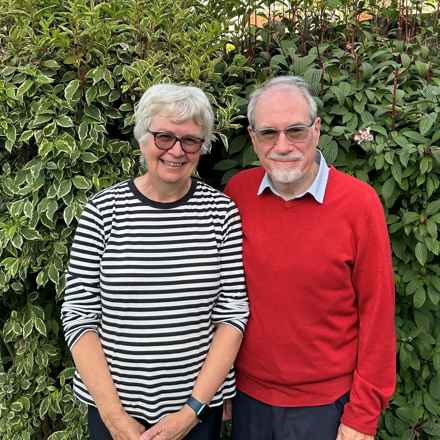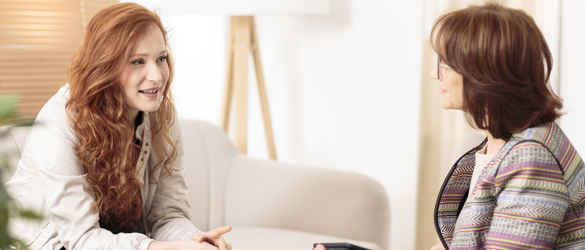“Counselling helped me express all the guilt”
Posted: Tuesday 07 January 2025
For two decades Jane has been dedicated to supporting her husband Ed since his diagnosis with macular disease. While she has always been firmly by his side, Jane admitted she has often felt a great sense of guilt – a feeling which resonates with many friends, family members or carers of people living with sight loss.
Despite this, for nearly 20 years she had not considered getting help to better understand or process her own emotions.
That changed when Jane was made aware of the Macular Society Counselling service for friends and family. Through the service, she found a safe space to share her thoughts and feelings with others who truly understood.
“I just didn't even think that such a thing would be there for the partner of someone with sight loss,” said Jane.
“With my experience, I thought I might go into it being able to help somebody else come to terms with what they’re going through but the counsellor was probing and asking ‘no, what about you?’
“It did help me, it was really good dealing with my feeling of guilt, because that has always been hard for me.”
Feeling guilt as a carer
Jane explained her guilt comes from feeling frustrated, such as in situations where there is no other help available.
She said: “There was an incident last year when Edward suddenly didn’t feel well and he passed out while I was driving along a smart motorway, with nowhere to turn into. Thankfully he was okay but it hammered home that nobody else could drive, and if I didn’t then what would we have done? But I was able to talk about this in my counselling, it was about being able to talk to people about the situation we’re in, how that made me feel and understanding what it is like for me to be the only person who can sort things out.
“It helped me express all the guilt issues I had faced so that was just so helpful. The big things was the counselling gave me a safe place to talk, knowing that you're not going to have any sort of condemnation or criticism, because I think I have found sometimes talking to people who aren't in this situation don't understand.
“If you express some frustration, people’s instant reaction is ‘but poor Edward’, which is absolutely true. Whereas, in this group, everybody was in the same boat, you could just say how it was.”
She added: “I'd forgotten, in a sense, that there is still a lot of effort involved from both sides, there is a lot of responsibility and feelings you have and counselling made me realise not to minimise those things.”
Fearing an unknown future
Ed, who has a juvenile macular dystrophy is now a Skills for Seeing trainer with the Macular Society. He uses his experience to help others with sight loss, teaching them how to make best use of their remaining vision to continue doing the things they love.
But Jane opened up about her fears about the future when he was first diagnosed.
She said: “I honestly wondered how were we going to cope. How was I going to cope with him being at home all the time? We were both really stressed and upset about it. I was upset he was going to lose his sense of purpose. Thankfully Ed’s always remained fairly confident on his feet and walking around so that’s been a big help.
“I’ve not had to guide him around so to speak, but I’ve had the pain of seeing him not be able to enjoy his hobbies as much as he once did. He loves cricket, he’d play and watch it. And of course we didn’t know how fast his sight would deteriorate and we thought ‘oh goodness, he’s not going to be able to see the grandchildren’ so that was really important for him too.”
New life experiences
Despite the challenges Jane said she wouldn’t change Edward’s diagnosis.
She said: “It would be amazing for him to see the cricket again and do the things he loved doing before. But having said all that, what we’ve been through I would say has been a very positive experience in the long run.
“Yes, in the short term it was hard, and obviously it still has its difficulties, but we both have improved and enhanced elements of our lives because we’ve learned so much about this, and we’re closer than ever.
“In a way, we’ve had new life experiences, maybe things we wouldn’t have chosen but now we’re in it, and as we’ve changed, I wouldn’t necessarily change anything. A lot of good has certainly come out of this.”
Would you like to connect with others who understand the challenges of supporting someone with macular disease?
To find out more about the Macular Society Counselling service, call our Helpline.
Are you caring for someone with macular disease?
We are here to help. It can be difficult to understand central vision loss. It may appear that a person can see some things when they want to.
Macular Society Counselling service
Are you dealing with the emotional challenges of macular disease? It can help to speak to a professional counsellor, who is trained to listen and to talk through your feelings and help you find ways of dealing with them. Use our free service today.
Other support available to you
We provide free information and support to those with macular disease, along with their family and friends, to help people keep their independence.





